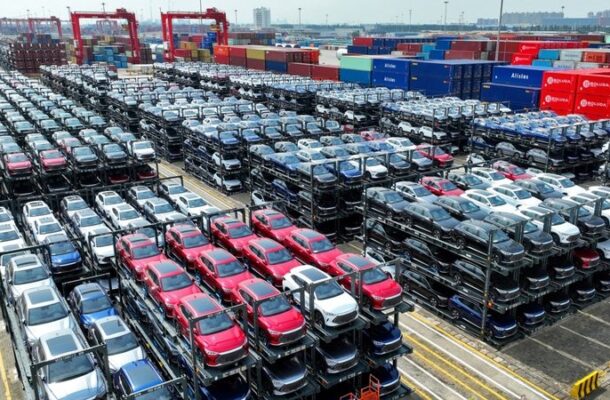The European Union's recent decision to impose tariffs on Chinese electric cars has raised concerns of retaliation from Beijing. As tensions rise, the
The European Union’s recent decision to impose tariffs on Chinese electric cars has raised concerns of retaliation from Beijing. As tensions rise, the impact on European industries, particularly cognac producers, remains uncertain.
Introduction: A Tense Trade Climate
The European Union (EU) finds itself on the brink of a potential trade conflict with China following its decision to impose tariffs on electric cars imported from the country. The EU argues that these vehicles benefit from unfair state subsidies, which distort competition within the European market. As speculation mounts regarding Beijing’s possible retaliation, industries across Europe, notably cognac producers, brace for the repercussions of this escalating trade tension.
Tariffs Imposed: A Strategic Decision by the EU
On Friday, the EU officially voted to implement tariffs on electric cars from China, a move that has been met with apprehension. Brussels conducted a year-long investigation that concluded with evidence suggesting that Chinese electric vehicle manufacturers are unfairly subsidized. The decision to impose tariffs aims to protect the European car industry, a vital sector that employs approximately 14 million people across the continent.
France, a strong advocate for these tariffs, believes that safeguarding local businesses is essential for maintaining competitiveness. However, the implications of this decision extend beyond the automotive sector, as various industries, particularly agriculture, prepare for potential fallout.
Cognac Producers Fear Retaliation
As the grape harvest season draws to a close in southeastern France, cognac producers express concern over possible Chinese retaliation. With over a third of cognac exports headed to China, the industry’s future hangs in the balance. Anthony Brun, a representative from the General Union of Cognac Producers, warns that “they can impose an import tariff of 40% on us tomorrow, which could put our existence in this market at risk.”
Producers feel that they are being sacrificed in this trade dispute, with Brun stating, “Since France is leading this policy, they will seek to hit a product that belongs exclusively to France.” This sentiment reflects the broader anxiety among industries that rely heavily on exports to China.
Divisions Within the EU: Germany’s Opposition
While France and other countries in the EU supported the tariffs, Germany, the bloc’s largest economy, voted against the measure. German automakers are particularly concerned about the potential repercussions of China’s retaliation. Hildegard Mueller from the German Association of the Automotive Industry warned that “the current decision will bring new trade conflicts, a spiral of protectionism.”
This division within the EU highlights the complex dynamics at play, as member states grapple with the need to protect domestic industries while maintaining lucrative trade relationships with China.
Ongoing Negotiations and Future Implications
In response to the tariffs, China has already initiated investigations into imports of pork and dairy products from Europe. However, both Brussels and Beijing have indicated that they are engaged in ongoing negotiations to seek a compromise. Julia Poliscanova from the Environmental and Transport Policy Group believes that “ultimately, it is the European market that offers the biggest scope for Chinese electric car exports. So China needs the EU as much as we need China.”
Despite the tensions, there is hope that diplomatic discussions could prevent a full-blown trade war. The EU asserts that the new tariffs comply with World Trade Organization (WTO) rules, with fees varying based on individual subsidy levels.
A Global Perspective: North America’s Role
The EU’s decision follows similar actions taken by the United States and Canada, which have both significantly raised tariffs on Chinese electric cars. These measures reflect a growing global trend towards protectionism in response to perceived unfair trade practices. As the situation develops, the EU must navigate the delicate balance of protecting its industries while fostering cooperative relationships with international trading partners.
In conclusion, as Europe awaits China’s response to its tariffs on electric cars, the stakes are high for various industries. The potential for retaliatory measures looms large, especially for sectors like cognac production that are intricately linked to Chinese markets. The outcome of this trade dispute will undoubtedly shape the future of European and Chinese economic relations in the months to come.

COMMENTS